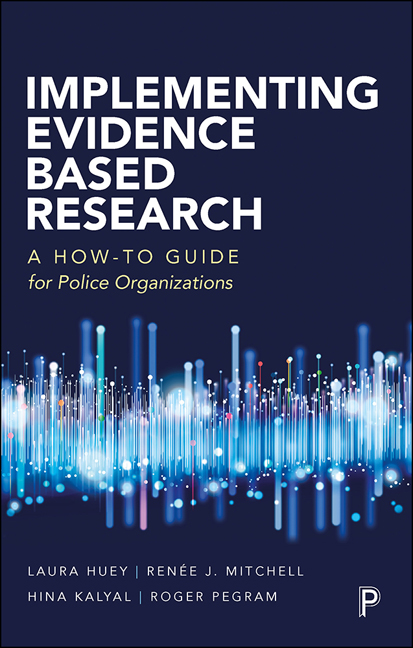Book contents
- Frontmatter
- Contents
- List of tables and figures
- Acknowledgments
- Introduction
- 1 Implementing evidence-based policing
- 2 Situating evidence-based policing
- 3 Understanding research
- 4 The individual approach
- 5 The smaller agency
- 6 The mid-sized agency
- 7 The larger agency
- 8 Generating sustainability
- 9 Resources for evidence-based practices
- Endnotes
- References
- Index
6 - The mid-sized agency
Published online by Cambridge University Press: 05 January 2022
- Frontmatter
- Contents
- List of tables and figures
- Acknowledgments
- Introduction
- 1 Implementing evidence-based policing
- 2 Situating evidence-based policing
- 3 Understanding research
- 4 The individual approach
- 5 The smaller agency
- 6 The mid-sized agency
- 7 The larger agency
- 8 Generating sustainability
- 9 Resources for evidence-based practices
- Endnotes
- References
- Index
Summary
While it might seem that mid-sized agencies typically have greater resources than smaller services, this doesn't mean they always know where those resources are, or how to best make use of them when it comes to implementing evidence-based policing (EBP). This reality is often reflected in the fact that many larger police services, despite having trained research staff, pracademics, and/or other resources to hand, do not appropriately target problems or test or track new initiatives (Slothower et al, 2015). To illustrate: a recent survey on receptivity EBP approaches by mid-sized Canadian police services found ‘mixed views were expressed by respondents in relation to their agency's ability to target high priority policing problems and to test strategies for fixing these problems … [and] views were overwhelmingly negative when respondents reflected on how well they thought their agencies track the effectiveness of strategies over time’ (Huey et al, 2017: 544).
In this chapter, we focus on identifying existing and potential resources that mid-sized agencies can draw on to implement EBP practices and maximize research creation and use. We also present successful strategies and practices that have been used by police agencies across the globe, and discuss the strengths and limitations of those approaches given resource, workload, funding, and other issues. We explain where challenges might lie for the mid-sized agency, as well as some ideas for surmounting obstacles. And, as in other chapters, we draw on the relevant literature, our own experiences, and the experiences of police officers who are working within the EBP domain, to present some old and some new ideas for implementing different EBP strategies.
The mid-sized agency
We have defined as a ‘medium’ or ‘mid-sized’ agency one in which there are 100 or more sworn officers but fewer than 1,000 (100–999). As is the case with smaller agencies, police services in Australia and the UK will generally not meet this criterion. By way of contrast, it has been estimated that there are some 700 ‘mid-size’ agencies in the USA alone (IACP, 2014). In the USA and Canada, mid-sized agencies are typically municipal or smaller regional or county services. We can point to Akron Police Department in Ohio (approximately 450 officers) as an example of a municipal service and Camden County Police Department in New Jersey (approximately 400 officers).
- Type
- Chapter
- Information
- Implementing Evidence Based ResearchA How-to Guide for Police Organizations, pp. 105 - 128Publisher: Bristol University PressPrint publication year: 2021



